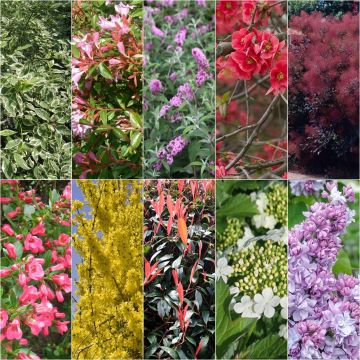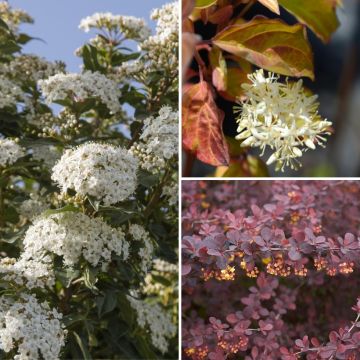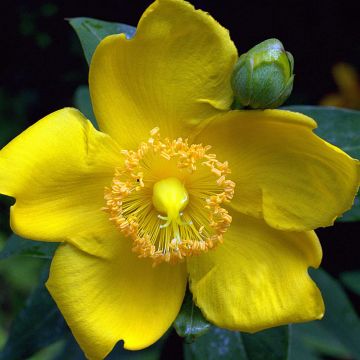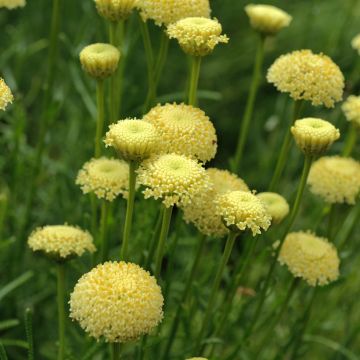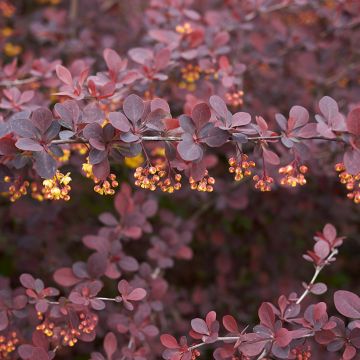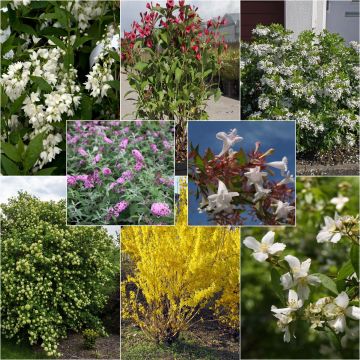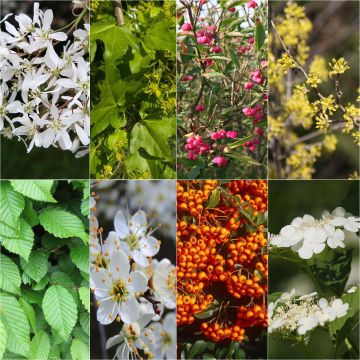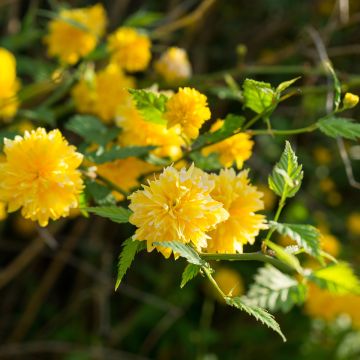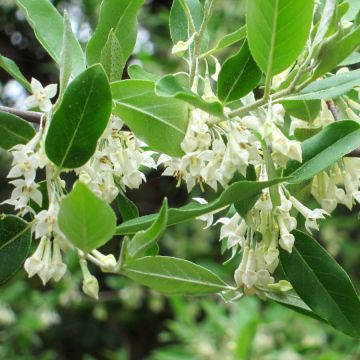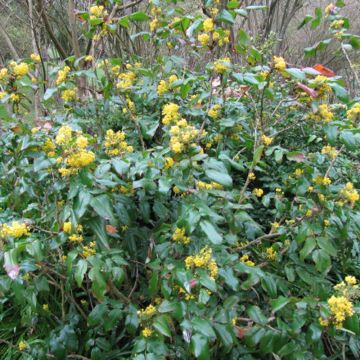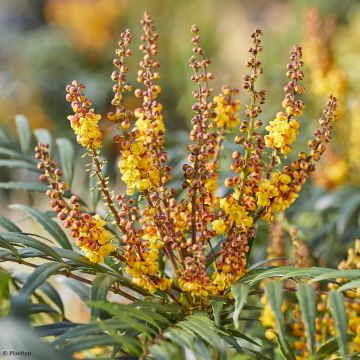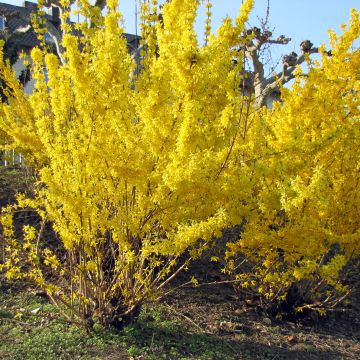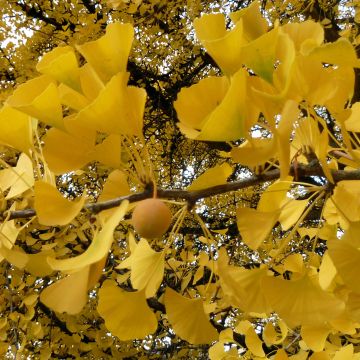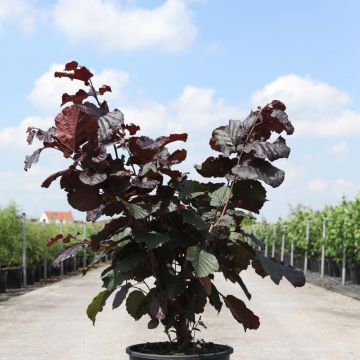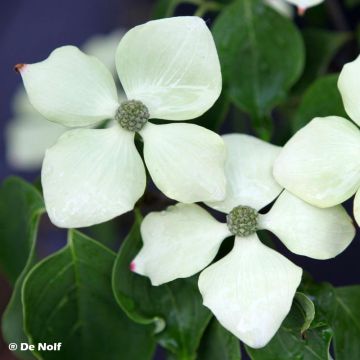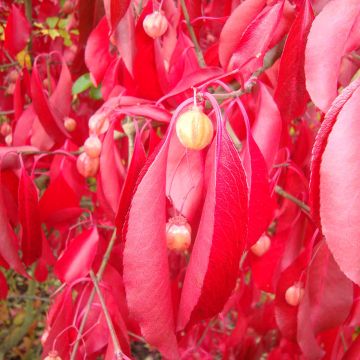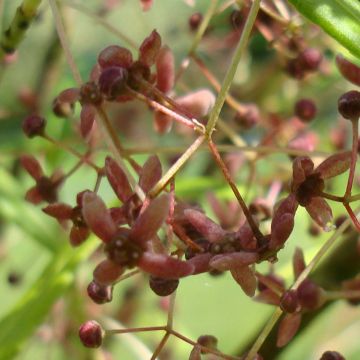Shipping country and language
Your country of residence may be:
Your country of residence is:
For a better user experience on our website, you can select:
Your shipping country:
Andorra
Austria
Belgium
Bulgaria
Canada
Chile
Croatia
Cyprus
Czechia
Denmark
Estonia
Finland
France
Germany
Greece
Hungary
Iceland
Ireland
Italy
Latvia
Lithuania
Luxembourg
Malta
Monaco
Netherlands
Poland
Portugal
Romania
Slovakia
Slovenia
Spain
Sweden
Switzerland
United Kingdom
We only deliver seed and bulb products to your country. If you add other products to your basket, they cannot be shipped.
Language:
French
German
Spanish
English
My Account
Hello
My wish lists
Plantfit
Log in / Register
Existing customer?
New customer?
Create an account to track your orders, access our customer service and, if you wish, make the most of our upcoming offers.
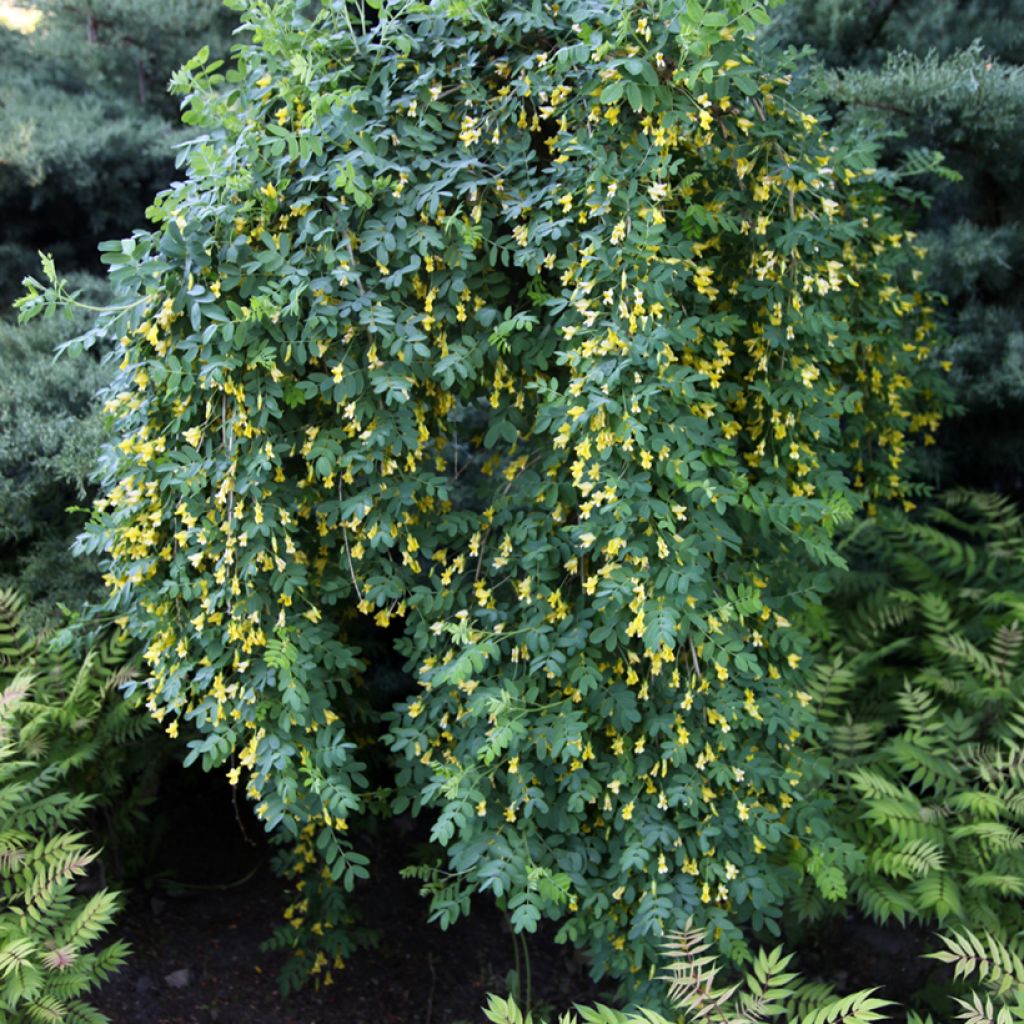

Caragana arborescens Pendula - Siberian Pea Tree.
Caragana arborescens Pendula - Siberian Pea Tree.
Caragana arborescens Pendula
Siberian Peashrub, Siberian Pea Tree, Caragana.
Why not try an alternative variety in stock?
View all →Order in the next for dispatch today!
Dispatch by letter from €3.90.
Delivery charge from €5.90 Oversize package delivery charge from €6.90.
More information
This item is not available in your country.
Schedule delivery date,
and select date in basket
This plant carries a 24 months recovery warranty
More information
We guarantee the quality of our plants for a full growing cycle, and will replace at our expense any plant that fails to recover under normal climatic and planting conditions.
Oversize package: home delivery by special carrier from €6.90 per order..
Express home delivery from €8.90.
Does this plant fit my garden?
Set up your Plantfit profile →
Description
Caragana arborescens 'Pendula' is a variety of bush or Siberian Peashrub grafted on a stem, without thorns, with a weeping crown that reaches the ground. This deciduous shrub, also known as 'Siberian Pea' because of its light yellow pea-like melliferous flowers, is as elegant as it is hardy. It deserves a prominent place in the garden or in a container on the terrace.
Caragana arborescens 'Pendula' belongs to the Leguminosae (Fabaceae) family. This variety is usually grafted on a stem of 80 cm to 1.50 m to enhance its weeping and trailing habit. The grafting on a stem also gives the shrub height, which facilitates maintenance and pruning. The species is native to Siberia, Mongolia, Kazakhstan, China, and Korea. It is often found in steppes, meadows, on rocky slopes, on the edge of forests, and on riverbanks. Hardy well below -20°C, this plant tolerates a wide range of soils, from slightly acidic to very chalky, even poor ones, but it dislikes waterlogged soils. Its very deep root system allows it to withstand drought once the shrub is well established.
The Siberian Peashrub 'Pendula' is a moderately fast-growing deciduous shrub. It consists of an upright trunk topped with a trailing crown. The plant can reach a height between 1.50 m and 2 m with a similar width, although it can be kept smaller through pruning. Its deciduous, dense, very fresh light green foliage consists of leaves divided into 5 to 7 pairs of small oval and hairy leaflets of about 2 cm. They turn yellow in autumn before falling. Flowering takes place from April to May. Short clusters of light yellow pea-like flowers bloom here and there among the foliage, on the previous year's wood. This nectar-rich and melliferous flowering is followed by the formation of 5 cm long pods, most often sterile. In Caragana, the young pods, as well as the peas and flowers, are edible.
The 'Pendula' Siberian Peashrub will form an elegant specimen in small spaces, including in our very cold regions and in poor soils. In an elegant bed dedicated to it, you can plant Variegated Greater Periwinkle or salvias, especially shrub salvias with blue flowers ('Blue Note', 'Delice Aquamarine') or ground-covering Salvia forreri in a mild climate garden.
Plant habit
Flowering
Foliage
Botanical data
Caragana
arborescens
Pendula
Fabaceae
Siberian Peashrub, Siberian Pea Tree, Caragana.
Central Asia
Planting and care
Plant Caragana arborescens 'Pendula' in spring in cool to cold regions, in autumn in hot and dry regions in summer. Choose a very sunny exposure. Plant it in well-prepared, deeply loosened soil. It is not undemanding in terms of soil, but it dislikes waterlogged and/or excessively acidic soils. If your soil tends to be heavy and clayey, dig a 60 cm hole and fill it with a mixture of garden soil, coarse sand or gravel, and leaf compost. This bush tolerates limestone in the soil very well and is satisfied with rainwater, in all regions, once it is well established. Water during the first two summers, especially in hot and dry regions, abundantly but spaced out. It can withstand strong frosts below -15°C even when young. Avoid moving it, as transplanting this family of plants (Fabaceae) is often difficult due to their deep root system.
This bush has few enemies in open ground, except for excessively wet soils that can harm its roots. A soil that is too fertile, as is often the case with Fabaceae, will promote the development of foliage at the expense of flowering.
Cultivated in a container, this Caragana will need regular watering from spring until early autumn.
Planting period
Intended location
Care
This item has not been reviewed yet - be the first to leave a review about it.
Spring-flowering shrubs
Haven't found what you were looking for?
Hardiness is the lowest winter temperature a plant can endure without suffering serious damage or even dying. However, hardiness is affected by location (a sheltered area, such as a patio), protection (winter cover) and soil type (hardiness is improved by well-drained soil).

Photo Sharing Terms & Conditions
In order to encourage gardeners to interact and share their experiences, Promesse de fleurs offers various media enabling content to be uploaded onto its Site - in particular via the ‘Photo sharing’ module.
The User agrees to refrain from:
- Posting any content that is illegal, prejudicial, insulting, racist, inciteful to hatred, revisionist, contrary to public decency, that infringes on privacy or on the privacy rights of third parties, in particular the publicity rights of persons and goods, intellectual property rights, or the right to privacy.
- Submitting content on behalf of a third party;
- Impersonate the identity of a third party and/or publish any personal information about a third party;
In general, the User undertakes to refrain from any unethical behaviour.
All Content (in particular text, comments, files, images, photos, videos, creative works, etc.), which may be subject to property or intellectual property rights, image or other private rights, shall remain the property of the User, subject to the limited rights granted by the terms of the licence granted by Promesse de fleurs as stated below. Users are at liberty to publish or not to publish such Content on the Site, notably via the ‘Photo Sharing’ facility, and accept that this Content shall be made public and freely accessible, notably on the Internet.
Users further acknowledge, undertake to have ,and guarantee that they hold all necessary rights and permissions to publish such material on the Site, in particular with regard to the legislation in force pertaining to any privacy, property, intellectual property, image, or contractual rights, or rights of any other nature. By publishing such Content on the Site, Users acknowledge accepting full liability as publishers of the Content within the meaning of the law, and grant Promesse de fleurs, free of charge, an inclusive, worldwide licence for the said Content for the entire duration of its publication, including all reproduction, representation, up/downloading, displaying, performing, transmission, and storage rights.
Users also grant permission for their name to be linked to the Content and accept that this link may not always be made available.
By engaging in posting material, Users consent to their Content becoming automatically accessible on the Internet, in particular on other sites and/or blogs and/or web pages of the Promesse de fleurs site, including in particular social pages and the Promesse de fleurs catalogue.
Users may secure the removal of entrusted content free of charge by issuing a simple request via our contact form.
The flowering period indicated on our website applies to countries and regions located in USDA zone 8 (France, the United Kingdom, Ireland, the Netherlands, etc.)
It will vary according to where you live:
- In zones 9 to 10 (Italy, Spain, Greece, etc.), flowering will occur about 2 to 4 weeks earlier.
- In zones 6 to 7 (Germany, Poland, Slovenia, and lower mountainous regions), flowering will be delayed by 2 to 3 weeks.
- In zone 5 (Central Europe, Scandinavia), blooming will be delayed by 3 to 5 weeks.
In temperate climates, pruning of spring-flowering shrubs (forsythia, spireas, etc.) should be done just after flowering.
Pruning of summer-flowering shrubs (Indian Lilac, Perovskia, etc.) can be done in winter or spring.
In cold regions as well as with frost-sensitive plants, avoid pruning too early when severe frosts may still occur.
The planting period indicated on our website applies to countries and regions located in USDA zone 8 (France, United Kingdom, Ireland, Netherlands).
It will vary according to where you live:
- In Mediterranean zones (Marseille, Madrid, Milan, etc.), autumn and winter are the best planting periods.
- In continental zones (Strasbourg, Munich, Vienna, etc.), delay planting by 2 to 3 weeks in spring and bring it forward by 2 to 4 weeks in autumn.
- In mountainous regions (the Alps, Pyrenees, Carpathians, etc.), it is best to plant in late spring (May-June) or late summer (August-September).
The harvesting period indicated on our website applies to countries and regions in USDA zone 8 (France, England, Ireland, the Netherlands).
In colder areas (Scandinavia, Poland, Austria...) fruit and vegetable harvests are likely to be delayed by 3-4 weeks.
In warmer areas (Italy, Spain, Greece, etc.), harvesting will probably take place earlier, depending on weather conditions.
The sowing periods indicated on our website apply to countries and regions within USDA Zone 8 (France, UK, Ireland, Netherlands).
In colder areas (Scandinavia, Poland, Austria...), delay any outdoor sowing by 3-4 weeks, or sow under glass.
In warmer climes (Italy, Spain, Greece, etc.), bring outdoor sowing forward by a few weeks.
